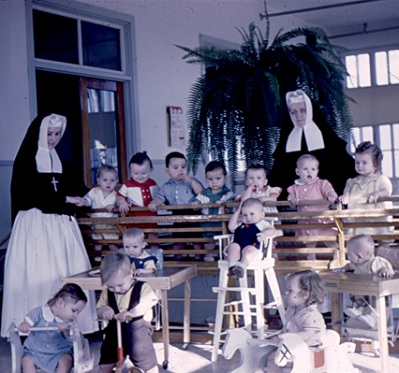Good Shepherd Sisters of Québec National Historic Event
Québec, Quebec

Crèche St-Vincent-de-Paul, n.a.
© Archives des Soeurs du Bon-Pasteur de Québec (D-10,09-116) | Archives of the Good Shepherd Sisters of Québec (D-10,09-116)
Address :
2550 rue Marie-Fitzbach, Québec, Quebec
Recognition Statute:
Historic Sites and Monuments Act (R.S.C., 1985, c. H-4)
Designation Date:
2010-01-12
Other Name(s):
-
Good Shepherd Sisters of Québec
(Designation Name)
Research Report Number:
2007-009, 2008-032, 2008-060
Importance:
Pioneers among those who have worked with marginalized women, they engaged in charitable works that have endured for more than 150 years
Plaque(s)
Existing plaque: 2550 rue Marie-Fitzbach, Québec, Quebec
Established in 1850, these sisters were among the first to work with girls and women excluded from society for transgressing the accepted norms of the period. Inspired by the latest 19th- and 20th-century methods for social rehabilitation, they built a network of institutions that provided assistance particularly to unwed mothers and their children, while adopting advances in perinatal care and re-education for reintegration. Guided by Christian charity, they filled gaps in the public system, and overcame constant financial difficulties and social prejudice to care for an otherwise neglected group.